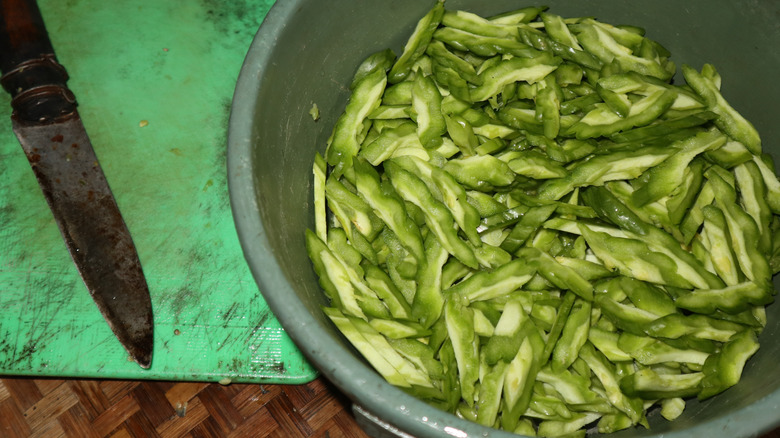If there’s one food group many of us should incorporate more into our diets, it’s vegetables. Rich in vitamins, minerals, and plant-based compounds, vegetables are essential for optimal body function. They are also excellent sources of fiber, which supports gut health and promotes satiety. While you might already enjoy popular choices like tomatoes, carrots, or potatoes, some lesser-known vegetables offer even more nutrients per serving.
If you’re not familiar with Asian cuisine, you might not have encountered bitter melon. Despite its name, bitter melon is not actually a melon but a gourd, similar to zucchini or squash. Bitter melon is packed with nutrients and is naturally low in calories, making it one of the most nutrient-dense vegetables you can add to your meals.
One cup of bitter melon contains only 16 calories, yet provides 2.6 grams of fiber and 87% of the recommended daily intake of vitamin C. Vitamin C acts as a potent antioxidant, aiding the body in combating oxidative stress, which has been linked to cancer and other chronic conditions. Additionally, this vegetable has a low glycemic index, making it an excellent option for those monitoring their blood sugar levels.
Bitter melon extract’s effect on blood sugar and cancer

The low glycemic index of bitter melon is not the only reason to consider this vegetable. Bitter melon extract may offer benefits comparable to the diabetes medication metformin in managing blood sugar levels. A 2011 study in the Journal of Ethnopharmacology found that individuals with newly diagnosed diabetes who consumed 2 grams of bitter melon daily for four weeks showed similar improvements in blood sugar markers as those taking metformin. While the exact mechanism by which bitter melon aids in lowering blood sugar remains unclear, it may enhance sugar utilization, reduce sugar absorption from food, or promote insulin production.
Bitter melon extract also contains compounds potentially effective against cancer. A 2020 review in Cancers highlighted that the phenolic acids and flavonoids in bitter melon help reduce inflammation and neutralize free radicals. Moreover, saponins and lectins may inhibit the growth of cancerous tumors, and certain proteins can induce cancer cell death. Bitter melon may also thwart cancer by disrupting its energy supply. However, most research on its anticancer properties has focused on extracts and laboratory studies.
Other benefits of bitter melon

The nutrients found in bitter melon may offer additional advantages beyond blood sugar regulation and potential cancer-fighting effects. This low-calorie, high-fiber vegetable might also aid in weight loss, as suggested by a 2015 review in the Journal of Lipids. Bitter melon may help the body store less fat and increase fat burning for energy, particularly in high-fat diets. It might also help reduce harmful abdominal fat, which is associated with an increased risk of heart disease. Laboratory studies have also shown that bitter melon can lower triglycerides and bad cholesterol levels.
As the name implies, bitter melon has a naturally bitter flavor when raw, and this bitterness intensifies as the fruit ripens. Fortunately, cooking bitter melon can mitigate its bitterness, making it easier to enjoy its health benefits. When preparing bitter melon, slice it open and remove the seeds and white pith, as this part is the most bitter. Then, slice it into strips and blanch them briefly in boiling water to further mellow the taste. Bitter melon pairs surprisingly well with rich foods like eggs. Consider scrambling them together for a simple, delicious dish (per The Woks of Life).
“`




